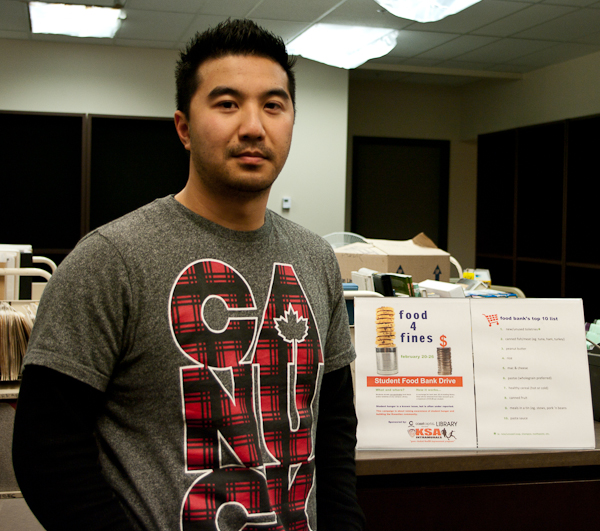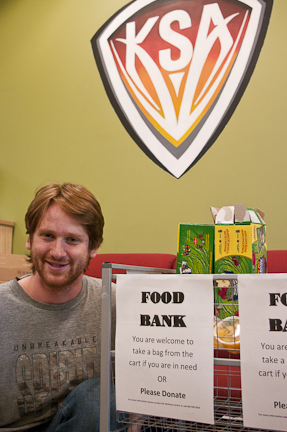Food for Fines aims to help hungry students
February 17, 2011 by Jeffrey Yip · Leave a Comment

KSA Health & Recreation Manager, Eddie Lee, hopes the Food for Fines drive from Feb. 20-26 will give students incentive to donate to the food bank. Photo by Matt Law.
The KSA has partnered with the Kwantlen library to raise awareness about student hunger and generate donations for the KSA food bank.
“We wanted to provide incentive for them to donate. At the same time we wanted them to recognize that other students are in need and that they can really help and make a difference,” said Eddie Lee, KSA health and recreation manager.

A lack of donations have forced the KSA to spend students' money to fill the demands of the the food bank. (Photo by Matt Law.)
The Food for Fines program, Feb. 20-26, allows students to bring in non-perishable food items or new or unused toiletries to any campus library and receive $2 off fines for overdue items, up to a maximum of $10.
Lee got the idea from other universities that have had success with similar programs.
According to Lisa Hubick, public relations librarian, the library was happy to participate. She said the library had a history of helping local community food banks, but this was the first time they will be able to directly help out Kwantlen students.
While she admits that fines aren’t a huge problem with Kwantlen students, she hope students will take advantage of the Food for Fines program and help out fellow students.
Currently, the KSA food bank buys most of the food they need. According to Lee, they spend about $500 a semester on food bank supplies.
“The idea was to tug at the heart strings a little bit, as opposed to just doing a regular food drive,” Lee said of the program.
For more information on the food bank visit http://kwantlen.weebly.com/student-food-bank.html.
Food bank offers help for struggling students

Nathan Griffiths, of the KUSA, explains that food donations for the student food bank are often so low the association has to purchase food so that there is enough. (Photo by Matt Law)
With increasing costs for students, Kwantlen University’s food bank is playing an increasingly important role.
In September, the jobless rate in B.C. rose 0.2 per cent according to B.C. Stats, which put the jobless rate at 7.5 per cent, 0.5 percent below the national average of eight per cent. Youth in B.C. (ages 15-24), face an even higher unemployment rate of 14.4 per cent.
“There is kind of an untold story and sad truth about student hunger. Students unfortunately are paying more in tuition than they ever have before and often earning less than they did before,” said Nathan Griffiths, marketing & communications coordinator for the Kwantlen University Student Association.
The KUSA has been running the current form of the food bank for roughly one year and offers discreet support for students in need.
“We look for any non-perishable food items and there’s drop-off and pick-up locations around campuses, generally next to the KUSA offices,” said Griffiths.
Students are free to drop off or pick up food from these locations as needed. It is an open system that anyone can make use of.
“As with any food bank, unfortunately the need outweighs the supply. So the KUSA, through the student health improvement program, buys additional food to ensure that there’s always food in the food basket,” Griffiths said.
The KUSA also offers a program for students who have a more serious need for financial assistance.
“We have an auxiliary program for students who need even more food. There are about a dozen students on this program, where we leave a larger basket in an undisclosed locker for them and they can pick it up if they need. That’s for if there is an identified serious problem,” said Griffiths
The counselling department will identify students who are in need of this support and connect them with the program.
“Nobody needs to know they are using the food bank program; it is completely anonymous,” said Griffiths.


